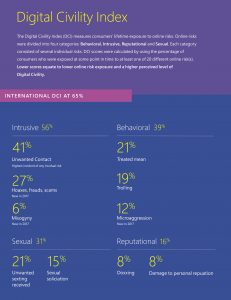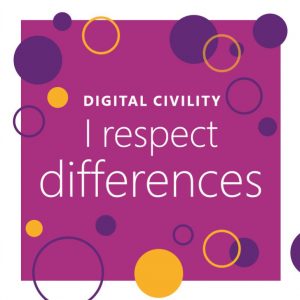According to our latest study, people’s digital interactions and responses to online risks appear to be improving around the world – though perhaps surprisingly, many of those who have been targeted for abuse online say their perpetrators came from their immediate families and social circles.
Indeed, nearly two in three respondents (61 percent) said they had some familiarity with their online abusers. More than a third (36 percent) said they knew the perpetrator personally: 17 percent responded that the perpetrator was a friend or a family member, while nearly one in five (19 percent) said the perpetrator was an acquaintance. One quarter of those surveyed said the offender was someone they knew only online, and 37 percent said their online risk exposure came from a stranger. Family and friends accounted for a high percentage of perpetrators among those who said they were bullied online (41 percent) or discriminated against (36 percent).
These are some of the findings of Microsoft’s latest study, “Civility, Safety and Interactions Online – 2017,” which measured the perceptions of teens and adults about the online risks they face and how their interactions affect their lives.
We’re releasing this research in conjunction with international Safer Internet Day. We’re also reigniting our Digital Civility Challenge, asking people to pledge to live by four common-sense guidelines for safer online interactions, And, we’re inviting everyone to share examples of how they’re doing the right thing online using the hashtags #Challenge4Civility and #Im4DigitalCivility. This year’s Safer Internet Day theme is “Create, Connect and Share Respect: A better internet starts with you.”

Nine more countries included in 2017/2018 research
To highlight that theme, our research was conducted in June 2017 and, following on from last year’s study, gauges the attitudes and perceptions of teens (ages 13-17) and adults (ages 18-74) about the state of civility online today. We measured respondents’ lifetime exposure to 20 different online risks[1] – three more than the previous year – across four categories: behavioral, reputational, sexual and personal/intrusive.
The study was conducted in 23 countries, up from 14 countries in 2016, enabling us to prepare separate, regional reports for both Latin America and Asia.
Top online risks are ‘unwanted contact’ and ‘hoaxes, fraud and scams’
For the second year in a row, unwanted contact surfaced as the leading online risk that people experienced (among the 20 evaluated) — with 41 percent of respondents reporting being contacted online by someone they did not wish to hear from. This is down 2 percentage points from 43 percent the previous year. The next closest-ranked risk was hoaxes, fraud and scams as a collective with 27 percent of respondents reporting exposure during their lifetime. This is the first year this risk was included in this survey.
Additional highlights from our report include:
- More than half (53 percent) of people said they’d met their perpetrator in real life, about the same as last year. Within that group, 76 percent said they knew the offender before the online abuse happened.
- One respondent in 10 said they confronted the perpetrator, down 11 percentage points from the previous year, while retaliation dropped to 9 percent from 17 percent previously.
- Also, on the plus side, 66 percent strongly or somewhat agreed that overall, they were treated in a safe and civil manner online. Conversely, those who felt attacked (12 percent) suffered much higher rates of online risks and consequences.
- The Microsoft Digital Civility Challenge tenets rose toward the top of the actions taken in response to online risks. Three of the five suggested challenge steps were in the top 10 of those taken in response to exposure to online abuse: “stood up for themselves” ranked third, “paused before replying” ranked fourth and, “defended someone else” ranked sixth.
Digital Civility Challenge 2.0
Along with last year’s research, we launched our Digital Civility Challenge in 2017, asking people to pledge to live by four common-sense guidelines for safer, healthier online interactions. We’re reigniting that challenge this year, and asking supporters to take it one step further. In addition to (re-)committing to the challenge tenets and telling us that you’ve done so on social media, feel free to share with us. Use the hashtags #Challenge4Civility and #Im4DigitalCivility, examples of how doing the right thing online in the last year – or even the last day! – has made a positive difference for you, someone you know or your social circle and community.
Here are the Digital Civility Challenge actions:
- Live the Golden Rule by acting with empathy, compassion and kindness in every interaction, and treating everyone you connect with online with dignity and respect.
- Respect differences, honor diverse perspectives and when disagreements surface, engage thoughtfully, and avoid name-calling and personal attacks.
- Pause before replying to things you disagree with, and don’t post or send anything that could hurt someone else, damage reputations or threaten someone’s safety.
- Stand up for yourself and others by supporting those who are targets of online abuse or cruelty, reporting threatening activity and preserving evidence of inappropriate or unsafe behavior.
Consolidated catalog of online safety resources
Last year’s research indicated that a large portion of respondents (63 percent) either did not know, or were unsure, where to go for help if they encountered an online risk. Thankfully, that picture has improved with this latest round of research. Now, 45 percent of respondents, an improvement of 8 percent, said they know where to find help in managing online risks, and 46 percent said they are extremely or very confident in their ability to handle online risks.
Still, being that we’ve been producing online safety resources for the last 15 years, and working with others to create additional materials, we thought it might be useful to “map” some of those resources to the risks highlighted in our survey. We’ve included several Microsoft resources and highlighted some great pieces of information from others. That new resource can be found here.
Sharing best practices
As we inspire a movement to unite and grow a culture of digital civility, we again share some best practices for all stakeholders. Indeed, technology companies large and small, law- and policy-makers, educators and school officials, parents, young people and members of civil society all have a role to play in fostering online experiences that start with empathy and highlight inclusion and respect. In addition to these, we share the new manifesto for life online from our inaugural Council for Digital Good.
Partnering with others
These actions are the building blocks for the kind of online communities we want to engender and the type of positive and inclusive online movement we want to create. We thank our partners and collaborators that have taken up the digital civility banner and are launching their own initiatives and programs rooted in this universal message of treating each other with respect and dignity. Thanks to NoBully.org, the International Bullying Prevention Association, National Cyber Security Alliance, the organizers and affiliates of international Safer Internet Day, UNICEF and the Anti-Defamation League, to name just a few. We are eager to build momentum for additional projects and programs in 2018 and beyond.
We hope you’ll get involved this Safer Internet Day and become an advocate for digital civility today and every day. Our Online Safety website and Online Safety resources page offer advice and guidance for exploring and handling almost any online safety situation. And, for more regular news and information, you can connect with us on Facebook and Twitter. Remember to recommit to the Digital Civility Challenge, and here’s to a year of safe, healthy and productive online interactions!
____
[1] Risks included in study:
- Behavioral – Treated mean, trolling, online harassment, cyberbullying, swatting, micro-aggressions*
- Reputation – Doxing, damage to personal reputation, damage to work reputation
- Sexual – Receiving unwanted sexts, solicitation, sending unwanted sexts, sextortion, “revenge porn”
- Personal/Intrusive – Unwanted contact, hate speech, discrimination, terrorism recruiting, misogyny*, hoaxes/fraud/scams*
* Denotes new risk added to 2017/2018 study
At the time of writing of this post, Jacqueline Beauchere’s title was Chief Online Safety Officer.



